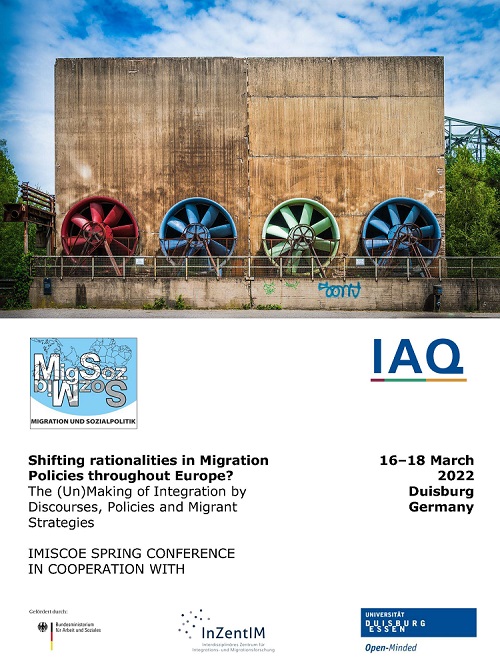InZENTIM (Interdisciplinary Centre for Integration and Migration Research), University of Duisburg-Essen, Germany is organising the 2022 IMISCOE Spring conference on 16-18 March 2022 on the topic of Shifting rationalities in Migration Policies throughout Europe? The (Un)Making of Integration by Discourses, Policies and Migrant Strategies.
The conference will take place online.
Conference Programme
Call for Papers (now closed)
Migration studies are increasingly reflecting and re-arranging their core categories and shifting their attention from questions of ‘what’ towards ‘how’ (Pisarevskaya et al. 2020). Consistent with a demigrantization of migration research (Dahinden 2016), they focus on modes of producing migrants and migration through policies. While it is hard to characterize current European migration and integration policies as being overall either liberal or restrictive, social and integration policies have become more intertwined with migration control (cf. Atac/Rosenberg 2019) in a fragmented manner at EU, nation state or regional level (cf. Bojadžijev 2011). Consequently, migrants are classified in multiple contradictory ways – according to their attributed legal status, their employability, their income and further categories like gender and/or race (cf. Morris 2002).
These developments result in a multiplication of migrants’ statuses, something which so far has not been connected adequately to (1) political programs, discourses and rationalities, (2) multilevel forms of governance and (3) migrants’ practices. One reason for this is the controversial debates about integration and its use as a scientific concept (cf. Alba/Nee 1997, Esser 2001, Kalter 2008). While some opt to enhance and further differentiate the concept as well as connecting it to further perspectives on migration (cf. Penninx 2019, Gisselquist 2020), others criticize the concept due to its perspective on society as a normalized unity with its inherent colonial history. Critics focus on multiple ways of differential inclusion and exclusion in order to describe the practices, strategies and identities of migrants in Europe (cf. Anderson 2013, Mezzadra/Neilson 2013, Morris 2020).
Against the background of these scientific and political developments the conference aims at bringing together scholars who are interested in these shifting rationalities in Migration Policies throughout Europe. The call invites scholars who examine the links between fragmented and intertwined multi-level policy fields of migration control, social policies and integration policies and who explore migrants’ practices, strategies and identities. This could include the following three non-exclusive areas with their respective issues and questions:
(1) Political programs, discourses and rationalities
As a central aspect of current national migration policies, the multiplication of statuses can be observed in different European welfare states in order to filter mobilities, opening access to social rights and integration for some migrants while closing it for others. The question is what overall rationalities and discourses shape these policies of inequality? How are nation state policies in this sense interlinked with European policies? And how is migrants’ diversity in respect to class, gender and race/ethnicity thereby addressed?
(2) Multilevel governance and the gap between policies
Local-level governance – though still involved in national, EU and supranational policies – is no longer considered merely as a field of policy implementation, but is an independent policy area shaping and developing processes of integration. These policies work in two directions: they offer integration opportunities in different areas such as education, labour or care for elderly persons; they also occur as emerging urban border spaces (Fauser 2020) readjusting migration on a local level. How do local authorities combine the different policy fields and contradicting objectives? How do individual organizations or street-level bureaucracies translate policies into practice and which (non-political) actors shape the field of integration practices? How do they use their scope for decision-making and how do they develop strategies apart from public policies?
(3) Migrants’ everyday life practices, strategies and identities
We still know little about the effects of status positioning on processes of integration or in a wider sense about the impact of migration policies and their varying local implementation on the everyday life of migrants. What strategies do migrants develop to achieve their goals within specific politically structured environments? What can we learn from migrants’ practices and strategies? What role do categories such as class and gender play for them?
We invite proposals for presentations to the outlined topic. Authors should send their abstracts (max. 250 words) by 31st of October 2021 to
Confirmed keynote speaker
Lydia Morris
Local Organizers
Dr. Thorsten Schlee, Dr. Katrin Menke, Andrea Rumpel and Sandrine Bakoben (Institute Work, Skills and Training, InZentIM)


